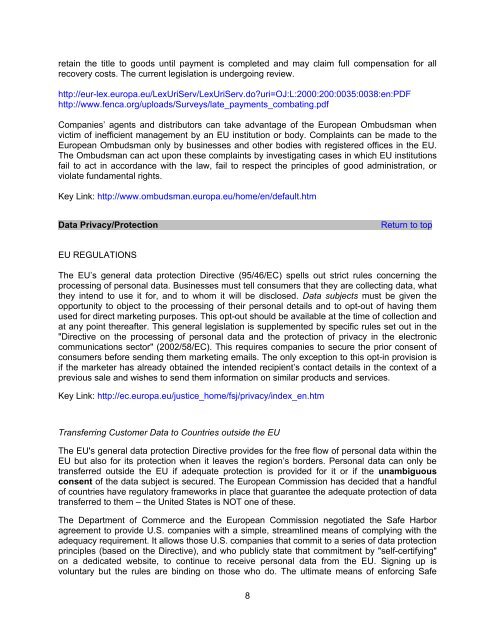Doing Business in Hungary 2010 - International Franchise Association
Doing Business in Hungary 2010 - International Franchise Association
Doing Business in Hungary 2010 - International Franchise Association
Create successful ePaper yourself
Turn your PDF publications into a flip-book with our unique Google optimized e-Paper software.
eta<strong>in</strong> the title to goods until payment is completed and may claim full compensation for all<br />
recovery costs. The current legislation is undergo<strong>in</strong>g review.<br />
http://eur-lex.europa.eu/LexUriServ/LexUriServ.do?uri=OJ:L:2000:200:0035:0038:en:PDF<br />
http://www.fenca.org/uploads/Surveys/late_payments_combat<strong>in</strong>g.pdf<br />
Companies’ agents and distributors can take advantage of the European Ombudsman when<br />
victim of <strong>in</strong>efficient management by an EU <strong>in</strong>stitution or body. Compla<strong>in</strong>ts can be made to the<br />
European Ombudsman only by bus<strong>in</strong>esses and other bodies with registered offices <strong>in</strong> the EU.<br />
The Ombudsman can act upon these compla<strong>in</strong>ts by <strong>in</strong>vestigat<strong>in</strong>g cases <strong>in</strong> which EU <strong>in</strong>stitutions<br />
fail to act <strong>in</strong> accordance with the law, fail to respect the pr<strong>in</strong>ciples of good adm<strong>in</strong>istration, or<br />
violate fundamental rights.<br />
Key L<strong>in</strong>k: http://www.ombudsman.europa.eu/home/en/default.htm<br />
Data Privacy/Protection Return to top<br />
EU REGULATIONS<br />
The EU’s general data protection Directive (95/46/EC) spells out strict rules concern<strong>in</strong>g the<br />
process<strong>in</strong>g of personal data. <strong>Bus<strong>in</strong>ess</strong>es must tell consumers that they are collect<strong>in</strong>g data, what<br />
they <strong>in</strong>tend to use it for, and to whom it will be disclosed. Data subjects must be given the<br />
opportunity to object to the process<strong>in</strong>g of their personal details and to opt-out of hav<strong>in</strong>g them<br />
used for direct market<strong>in</strong>g purposes. This opt-out should be available at the time of collection and<br />
at any po<strong>in</strong>t thereafter. This general legislation is supplemented by specific rules set out <strong>in</strong> the<br />
"Directive on the process<strong>in</strong>g of personal data and the protection of privacy <strong>in</strong> the electronic<br />
communications sector" (2002/58/EC). This requires companies to secure the prior consent of<br />
consumers before send<strong>in</strong>g them market<strong>in</strong>g emails. The only exception to this opt-<strong>in</strong> provision is<br />
if the marketer has already obta<strong>in</strong>ed the <strong>in</strong>tended recipient’s contact details <strong>in</strong> the context of a<br />
previous sale and wishes to send them <strong>in</strong>formation on similar products and services.<br />
Key L<strong>in</strong>k: http://ec.europa.eu/justice_home/fsj/privacy/<strong>in</strong>dex_en.htm<br />
Transferr<strong>in</strong>g Customer Data to Countries outside the EU<br />
The EU's general data protection Directive provides for the free flow of personal data with<strong>in</strong> the<br />
EU but also for its protection when it leaves the region’s borders. Personal data can only be<br />
transferred outside the EU if adequate protection is provided for it or if the unambiguous<br />
consent of the data subject is secured. The European Commission has decided that a handful<br />
of countries have regulatory frameworks <strong>in</strong> place that guarantee the adequate protection of data<br />
transferred to them – the United States is NOT one of these.<br />
The Department of Commerce and the European Commission negotiated the Safe Harbor<br />
agreement to provide U.S. companies with a simple, streaml<strong>in</strong>ed means of comply<strong>in</strong>g with the<br />
adequacy requirement. It allows those U.S. companies that commit to a series of data protection<br />
pr<strong>in</strong>ciples (based on the Directive), and who publicly state that commitment by "self-certify<strong>in</strong>g"<br />
on a dedicated website, to cont<strong>in</strong>ue to receive personal data from the EU. Sign<strong>in</strong>g up is<br />
voluntary but the rules are b<strong>in</strong>d<strong>in</strong>g on those who do. The ultimate means of enforc<strong>in</strong>g Safe<br />
8
















